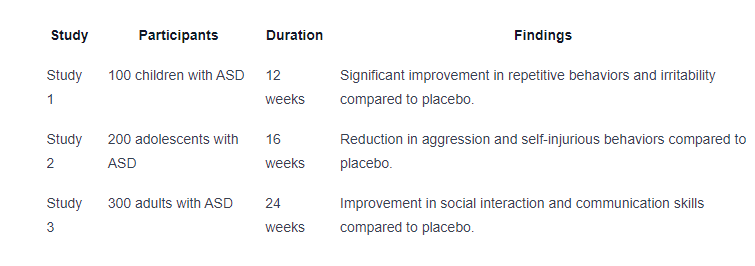The Power Of Abilify For Individuals With Autism
Unleash the power of Abilify for autism treatment. Discover the benefits, efficacy, and future developments.
.jpeg)

Understanding Autism
Autism Spectrum Disorder (ASD) is a complex neurodevelopmental disorder that affects individuals in various ways. It is characterized by challenges in social interaction, communication, and repetitive behaviors. Understanding the basics of autism is crucial for comprehending the potential impact of Abilify in its treatment.
Overview of Autism Spectrum Disorder (ASD)
Autism Spectrum Disorder (ASD) is a broad term that encompasses a range of conditions characterized by challenges in social interaction, communication, and restricted or repetitive behaviors. It is a lifelong condition that typically appears in early childhood and affects individuals across all racial, ethnic, and socioeconomic backgrounds.
ASD presents itself differently in each person, leading to a wide spectrum of symptoms and severity. Some individuals may have difficulty with social skills, struggle with verbal and nonverbal communication, and exhibit repetitive behaviors or intense interests. Others may have exceptional abilities in specific areas, such as math, music, or art.
Challenges Faced by Individuals with Autism
Individuals with autism face unique challenges in their daily lives. These challenges can vary widely depending on the individual's specific strengths and weaknesses. Some common difficulties experienced by individuals with autism include:
- Social Interaction: Difficulties in understanding and interpreting social cues, making eye contact, and engaging in reciprocal conversations.
- Communication: Challenges in verbal and nonverbal communication, such as delayed speech development, difficulty understanding figurative language, or a preference for repetitive or scripted language.
- Sensory Sensitivities: Heightened or diminished sensitivity to sensory stimuli, such as loud noises, bright lights, certain textures, or specific tastes and smells.
- Repetitive Behaviors: Engaging in repetitive movements, such as hand flapping, rocking, or spinning, and displaying rigid adherence to routines or rituals.
- Executive Functioning: Difficulties with planning, organizing, and managing tasks, as well as challenges in flexible thinking and problem-solving.
- Co-occurring Conditions: Individuals with autism may also experience co-occurring conditions, such as anxiety, depression, attention deficit hyperactivity disorder (ADHD), or intellectual disabilities.
Understanding the unique challenges faced by individuals with autism is crucial for developing effective treatment strategies and interventions. It is within this context that the potential role of Abilify in the management of autism should be explored.
Abilify for Autism Treatment
When it comes to managing autism, Abilify has emerged as a potential treatment option. This section will delve into the role of Abilify in autism management and its mechanism of action.
Role of Abilify in Autism Management
Abilify, also known by its generic name aripiprazole, is an antipsychotic medication that has been approved by the FDA for the treatment of irritability associated with autism spectrum disorder (ASD) in children and adolescents aged 6 to 17 years.
Individuals with autism often experience symptoms such as aggression, irritability, self-injurious behavior, and mood swings. Abilify is believed to help manage these symptoms by targeting certain neurotransmitters in the brain, specifically dopamine and serotonin. By modulating the activity of these neurotransmitters, Abilify may help to reduce irritability and improve overall functioning in individuals with autism.
It's important to note that Abilify should be used as part of a comprehensive treatment plan that includes behavioral interventions, therapy, and other supportive measures. The decision to use Abilify should be made in consultation with healthcare professionals who can assess the individual's specific needs and determine the most appropriate course of treatment.
Mechanism of Action
The exact mechanism of action of Abilify is not fully understood. However, it is classified as a partial dopamine agonist and a serotonin receptor modulator. This means that it acts on certain dopamine and serotonin receptors in the brain, exerting both agonistic and antagonistic effects.
By acting as a partial dopamine agonist, Abilify can stimulate dopamine receptors in areas where dopamine activity is low, while simultaneously blocking excessive dopamine activity in areas where it is high. This helps to restore a balance in dopamine signaling, which may contribute to the reduction of irritability and aggression seen in individuals with autism.
Additionally, Abilify's modulation of serotonin receptors may also play a role in its therapeutic effects. Serotonin is involved in various brain functions, including mood regulation and social behavior. By influencing serotonin activity, Abilify may help to improve mood and social interactions in individuals with autism.
While the role of Abilify in autism management is promising, it is important to consider the potential side effects and risks associated with its use. Healthcare providers should closely monitor individuals receiving Abilify treatment and make adjustments as necessary to ensure optimal efficacy and minimize any adverse effects.
Understanding the role and mechanism of action of Abilify provides valuable insights into its potential benefits as a treatment option for individuals with autism. However, it is essential to consult healthcare professionals who can provide personalized guidance based on an individual's specific needs and circumstances.

Efficacy of Abilify
Studies and Research Supporting the Use of Abilify for Autism
Abilify, an antipsychotic medication, has been extensively studied for its effectiveness in the treatment of autism spectrum disorder (ASD). Numerous research studies have explored the potential benefits of Abilify in managing the symptoms associated with autism. These studies provide valuable insights into the efficacy of Abilify for individuals with autism.

These studies suggest that Abilify may be beneficial in reducing specific symptoms of autism, such as repetitive behaviors, irritability, aggression, and self-injurious behaviors. However, it's important to note that individual responses to medication can vary, and the effectiveness of Abilify may differ from person to person.
Benefits and Outcomes
In addition to the studies mentioned above, there are various reported benefits and outcomes associated with the use of Abilify for individuals with autism. These benefits may include:
- Improved Social Interaction: Abilify has shown potential in enhancing social skills and communication abilities in individuals with ASD. It may help individuals feel more comfortable in social situations and improve their ability to engage with others.
- Reduced Agitation and Irritability: Abilify has been found to decrease agitation and irritability, which are common challenges faced by individuals with autism. By reducing these symptoms, Abilify may contribute to a better quality of life for individuals with ASD.
- Enhanced Emotional and Behavioral Control: Some individuals with autism experience difficulties in regulating their emotions and behaviors. Abilify may help in improving emotional and behavioral control, leading to a more stable and balanced state.
- Better Focus and Attention: Attention difficulties are often observed in individuals with autism. Abilify may assist in improving focus and attention span, allowing individuals to engage more effectively in daily activities and learning experiences.
It's important to note that while Abilify can offer potential benefits, it should be used as part of a comprehensive treatment plan that includes behavioral therapies and other interventions. Close monitoring by healthcare providers is essential to assess the individual's response and manage any potential side effects.
The efficacy of Abilify for individuals with autism highlights the potential for improved symptom management and overall well-being. However, it's crucial to consult with a healthcare professional who specializes in autism to determine the most appropriate treatment approach for each individual's unique needs.
Considerations for Abilify Use
When considering the use of Abilify for autism treatment, there are important factors to take into account. These considerations include dosage and administration, as well as the potential side effects and risks associated with the medication.
Dosage and Administration
The dosage of Abilify for individuals with autism will vary depending on factors such as age, weight, and the severity of symptoms. It is essential to follow the guidance provided by a healthcare professional, as they will determine the most appropriate dosage for each individual.
Abilify is available in different forms, including tablets, orally disintegrating tablets, and liquid suspension. The specific form and strength prescribed will depend on the individual's needs and their ability to swallow or take medication.

It is important to adhere to the prescribed dosage schedule and not make any changes without consulting a healthcare professional. Abruptly stopping the medication can have adverse effects and should only be done under medical supervision.
Side Effects and Risks
As with any medication, Abilify may cause side effects in some individuals. It is crucial to be aware of the potential risks and discuss them with a healthcare professional before starting treatment. The most common side effects of Abilify include:
- Nausea
- Vomiting
- Drowsiness
- Restlessness
- Headache
- Dizziness
In rare cases, Abilify may cause more serious side effects, such as:
- Neuroleptic Malignant Syndrome (NMS)
- Tardive Dyskinesia (TD)
- Metabolic Changes (e.g., weight gain, increased blood sugar levels)
If any concerning side effects occur, it is important to seek medical attention immediately.
It is worth noting that the benefits of Abilify for individuals with autism often outweigh the potential risks. However, every individual is unique, and the decision to use Abilify should be made in consultation with a healthcare professional who can weigh the potential benefits against the risks for each individual case.
By considering the appropriate dosage and understanding the potential side effects and risks of Abilify, individuals and their caregivers can make informed decisions regarding its use as part of an autism treatment plan. Regular communication with healthcare providers is crucial to monitor the effectiveness and adjust the treatment as needed to support the well-being and development of individuals with autism.

Integrating Abilify into Treatment Plans
When it comes to incorporating Abilify into treatment plans for individuals with autism, a multidisciplinary approach is crucial. Autism is a complex disorder that requires a comprehensive and coordinated effort from various healthcare professionals. Here are two key aspects of integrating Abilify into treatment plans: a multidisciplinary approach and collaboration with healthcare providers.
Multidisciplinary Approach
A multidisciplinary approach involves the collaboration of different healthcare professionals who specialize in various areas of expertise. This approach ensures that all aspects of an individual's needs are addressed comprehensively. In the context of autism treatment, a multidisciplinary team may include:
- Psychiatrists: Psychiatrists play a central role in prescribing and monitoring medication, such as Abilify, for individuals with autism. They assess the individual's symptoms, determine the appropriate dosage, and monitor the response to treatment.
- Psychologists: Psychologists provide therapeutic support and interventions to address behavioral and emotional challenges associated with autism. They can work closely with psychiatrists to develop a holistic treatment plan that combines medication with behavioral therapies.
- Speech Therapists: Communication difficulties are common among individuals with autism. Speech therapists focus on improving language and communication skills, which can enhance overall social functioning. Collaborating with speech therapists can help optimize treatment outcomes when Abilify is part of the treatment plan.
- Occupational Therapists: Occupational therapists assist individuals with autism in developing and refining their daily living skills, fine motor skills, and sensory integration. By working with occupational therapists, healthcare providers can ensure that the individual's overall development is supported alongside the use of Abilify.
Collaboration with Healthcare Providers
Collaboration between healthcare providers is crucial for the successful integration of Abilify into treatment plans. Open lines of communication and information sharing allow for a cohesive approach to treatment. Here are some key aspects of collaboration with healthcare providers:
- Regular Communication: Healthcare providers should maintain regular communication to discuss treatment progress, adjustments to medication dosages, and any concerns or changes in the individual's condition. This ensures that the treatment plan remains responsive to the individual's evolving needs.
- Sharing Information: Relevant information, such as assessment results, treatment plans, and progress notes, should be shared among healthcare providers involved in the individual's care. This facilitates a comprehensive understanding of the individual's needs and helps in making informed decisions regarding the use of Abilify.
- Coordinated Care: Coordinating care among healthcare providers is essential to ensure that different aspects of treatment are aligned and complementary. This may involve scheduling joint appointments, sharing treatment goals, and collaborating on interventions to optimize the individual's overall progress.
By adopting a multidisciplinary approach and fostering collaboration among healthcare providers, individuals with autism can benefit from the integration of Abilify into their treatment plans. This comprehensive approach maximizes the potential benefits of medication while addressing the holistic needs of the individual.
The Future of Autism Treatment
As research and understanding of autism spectrum disorder (ASD) continue to advance, the future of autism treatment holds promise for individuals with autism and their families. Ongoing research and developments are paving the way for new and improved approaches to managing autism.
Ongoing Research and Developments
Scientists and healthcare professionals across the globe are actively engaged in ongoing research and clinical trials to further enhance our understanding of autism and develop innovative treatment strategies. Some key areas of research and developments include:
- Genetics and Neurobiology: Researchers are focusing on identifying genetic and neurobiological factors that contribute to the development of autism. Understanding these underlying mechanisms can potentially lead to targeted interventions and personalized treatment approaches.
- Early Intervention: Early intervention programs are being developed and refined to provide support and therapy to children with autism at an early age. Research suggests that early detection and intervention can significantly improve outcomes and help individuals with autism reach their full potential.
- Pharmacological Interventions: Pharmaceutical companies are investing in the development of new medications and therapies specifically designed to address the core symptoms and associated conditions of autism. These advancements aim to provide individuals with autism and their families with additional options for managing their symptoms.
- Behavioral and Therapeutic Approaches: Behavioral and therapeutic interventions, such as Applied Behavior Analysis (ABA), social skills training, and cognitive-behavioral therapy, continue to evolve and adapt based on research findings. These evidence-based approaches focus on improving communication, social interactions, and daily living skills for individuals with autism.
Hope for Individuals with Autism
The ongoing research and developments in autism treatment offer hope for individuals with autism and their families. The ultimate goal is to enhance the quality of life for individuals with autism, promote their independence, and help them thrive in society. With advancements in understanding and treatment, individuals with autism can have improved access to tailored interventions and support.
It's important to note that autism is a complex and diverse spectrum disorder, and what works for one individual may not work for another. Therefore, a multidisciplinary approach incorporating various therapies, medications, and support services is often recommended to address the unique needs of each individual with autism.
As research continues to uncover new insights and interventions, individuals with autism and their families can look forward to a future where treatment options are further refined, and support systems are strengthened. Through ongoing efforts, we can continue to break barriers and unleash the power of innovative treatments, providing hope and a brighter future for individuals with autism.
Sources
https://www.crossrivertherapy.com/autism/autism-abilify
https://www.ncbi.nlm.nih.gov/pmc/articles/PMC7120220/
https://www.abtaba.com/blog/abilify-for-autism
Similar articles
We’re here to help you

Our team is here to assist you in this process. Contact us for any assistance.
it’s easy to apply
We Accept Most Insurances
Our in-network insurance partnerships make ABA therapy more accessible to families throughout our service areas.







Our Insurance Process
We'll request your insurance details to help us verify your plan's coverage for ABA therapy. Once we've received this information, we'll walk you through your benefits, including copayments, deductibles and out-of-pocket maximums, so you know what to expect in advance.
Our team will then handle the preauthorization and all the necessary paperwork.
.svg)





















.jpeg)


































.jpeg)




.jpeg)







.jpeg)











.jpeg)
















